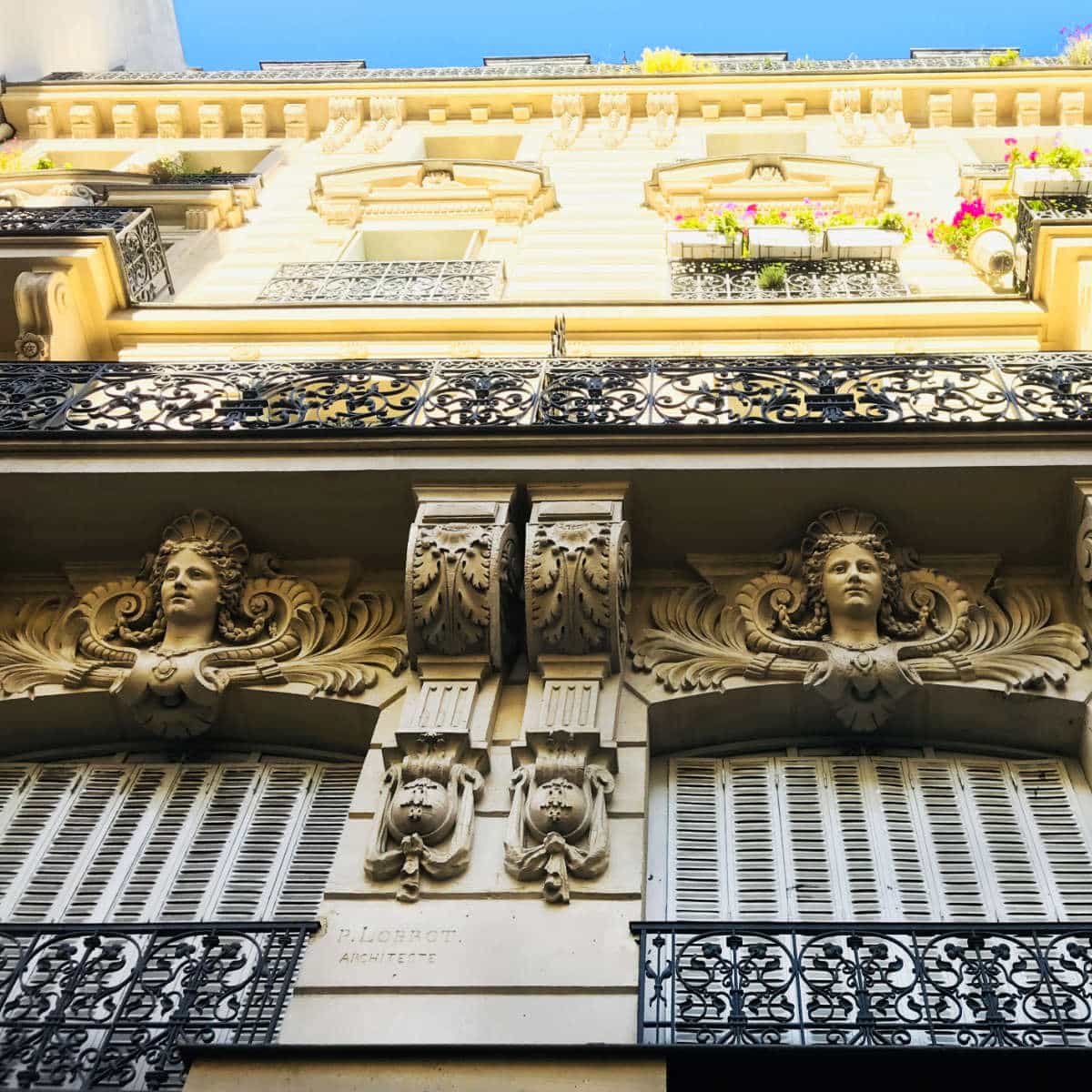French is often considered one of the most romantic languages in the world. There is that certain je ne sais quoi about being able to say you speak French.
It is also a language where grammar rules are treated with the kind of reverence usually reserved for fine wines and fancy cheese. And it is notorious for being a language where all the syllables are not pronounced, making it a rather difficult language to master.
And have I mentioned the fancy-schmancy accents and diacritical marks? You’ve got your acute accents (é), grave accents (è), circumflex accents (ê), cedillas (ç), and even that slippery little bugger known as the trema (ü).
But there is more to the French language than just the grammar and pronunciation. It is a language with a rich history, exquisite literature, many dialects, and a bright future. After all, who wouldn’t want to debate philosophy in a café while sipping espresso and pretending to conjugate in the subjunctive mood?
So let’s get to the most interesting facts about the French language, shall we? Allons-y!
- 1. It is a Romance language.
- 2. In Gallo-Roman times, it was part of Langue d'Oïl.
- 3. There are over 320 million French speakers in the world.
- 4. French is one of the official languages of diplomacy.
- 5. There is a disagreement over how to say certain French numbers.
- 6. About 45% of English words come from the French language.
- 7. The British Royal family still uses a French motto.
- 8. Ballet uses French terms.
- 9. French is one of the official languages of the Olympics.
- 10. King Françis I insisted that French become the official language of France.
- 11. A lot of culinary terms are in French.
- 12. French is an official language in over 29 different countries.
- 13. The popularity of French is on the rise
- 14. L’Académie Française decides what words belong in the French language.
- 15. The first cinema in the world was in French.
- 16. It has a lot of silent letters.
- 17. It is officially celebrated every March.
- 18. In French, objects and nouns are classified as male or female.
- 19. It doesn’t have any words starting with “W”.
- 20. Greetings are important in French.
- 21. French accents are different across France.
- 22. Tutoyer vs Vouvoyer: Showing respect in French.
- 23. Some famous fairytales were originally in French.
- 24. The government pays schools to promote French language education around the world.
- 25. French slang involves spelling words backwards.
- 26. Some English songs are translations of French songs or vice versa.
- 27. French Christmas songs are translations of English songs.
- 28. There are many internationally renowned French authors, whose works are translated to English.
- 29. French comics are very popular.
- 30. The Prix Goncourt is a much coveted prize for French authors.
- 31. French punctuation is written differently than in English.
- 32. The French word "faux pas" has entered the English lexicon.
- 33. Some French words are just sounds.
- 34. There is a debate in French whether the article goes with the person or the title.
- 35. There are 23 officially recognized regional languages in France.
1. It is a Romance language.
French is a Romance language that evolved from Latin, like Italian and Spanish. However, it is considered the most divergent from Latin, as it was heavily influenced by the next-door Germanic languages.
2. In Gallo-Roman times, it was part of Langue d’Oïl.
The word “langue” in French means “tongue” or “language”. Historically, the area that is now known as France had so many different Gallic tribes, languages and dialects, that it was broken down into two parts: Langue d’Oc and Langue d’Oil.
Dating back to the Gallo-Roman era, the differences in the languages were classified based on the response to the prominent word “yes”. In the north, the word for “yes” was “oïl“, which today is the sound “oui”. The current dominant French language is a descendant of this “Langue d’oïl“.
3. There are over 320 million French speakers in the world.
It is believed that there are over 320 million people in the world who use French on a daily basis. This includes people from across France and Europe, but also large countries in Africa like DR Congo, Algeria, Morocco, Cameroon, Ivory Coast and Tunisia who were former colonies or had a French presence there.
In addition, countries like Canada and Haiti in the Americas also have large French-speaking populations.
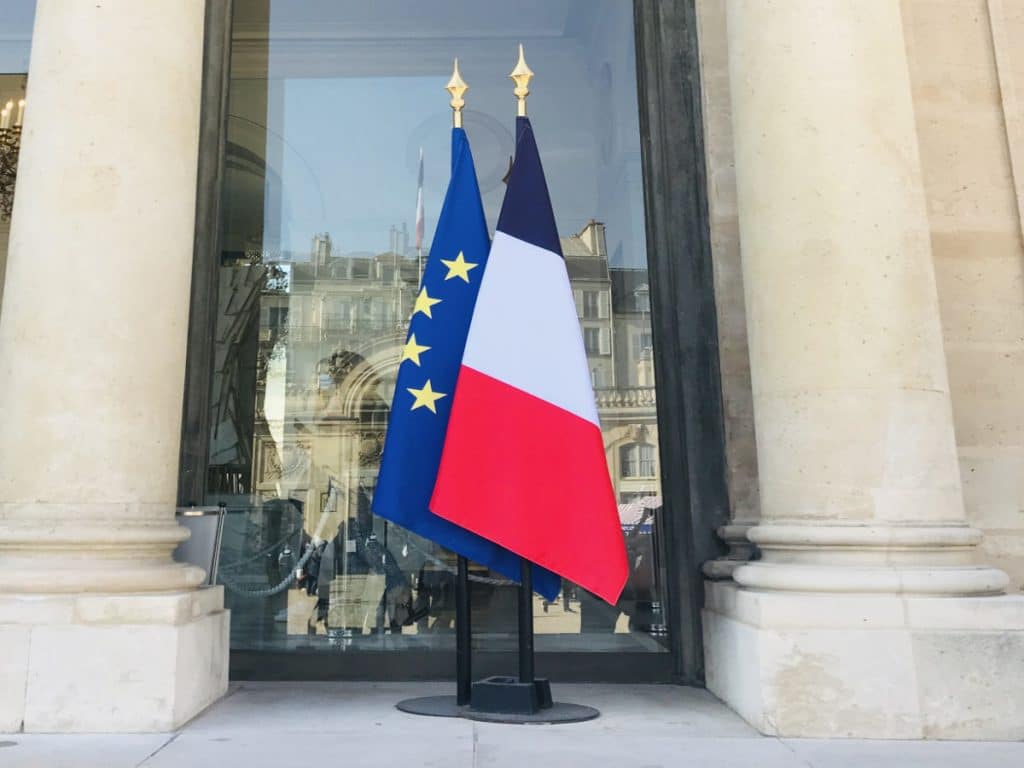
4. French is one of the official languages of diplomacy.
After WWII, the several new global institutions that were set up, included French as one of the official diplomatic languages.
French and English are the two official languages of NATO, and French is one of the 3 working languages of the European Union, along with English and German.
French is also one of the 6 official languages of the United Nations, and one of the UN Secretariat’s 2 working languages, along with English. It is also one of the official languages of NAFTA, OECD, and many more institutions.
5. There is a disagreement over how to say certain French numbers.
While French may be the official language of several international institutions, there is a serious disagreement about how to say particular French numbers.
In France, numbers above 69 are written while performing some complicated math calculations. Instead of coming up with a new word for 70, we start to perform some addition with seventy in French referred to as 60+10. And for 90, French literally translates to 4×20+10.
In Belgium and Switzerland, this was seen as unwieldy, so they changed 70 to septante and 90 to nonante. Which makes sense, except the Belge then decided to keep 80 in the French way, anyway!
To summarize, the number system at the moment looks like this:
| Number | France | Belgium | Switzerland |
|---|---|---|---|
| 70 | soixante-dix (60+10) | septante | septante |
| 71 | soixante-onze (60+11) | septante-et-un | septante-et-un |
| 80 | quatre-vingt (4×20) | quatre-vingt (4×20) | huitante |
| 90 | quatre-vingt-dix (4×20+10) | nonante | nonante |
| 91 | quatre-vingt-onze (4×20+11) | nonante-et-un | nonante-et-un |
Not very easy for a European banker or accountant! The system is so non-obvious, French maternelle (kindergarten) kids learn to count up to 69 in the beginning, rather than up to 100.
6. About 45% of English words come from the French language.
When William the Conqueror went across the English Channel from the Duchy of Normandy, he took his language with him.

Leaving his wife and children behind in Normandy, he fought and solidified his hold on England.
William didn’t speak much English, so the language of the (English) court was French. As such, approximately 45% of words in English are rooted in French.
7. The British Royal family still uses a French motto.
Many of William’s descendants continued to speak French rather than English, with the motto of the English monarch becoming:
Dieu et mon droit
French-English translation: God and my right
From the Plantagenets, Tudors, and Stuarts, on down, William’s descendants continued to have their motto in French.
☞ READ MORE: French travel phrases you need for a trip to France
8. Ballet uses French terms.
It was Sun King Louis XIV who really fell in love with ballet and brought it to his court at Versailles. He loved it so much, he even danced at times himself.
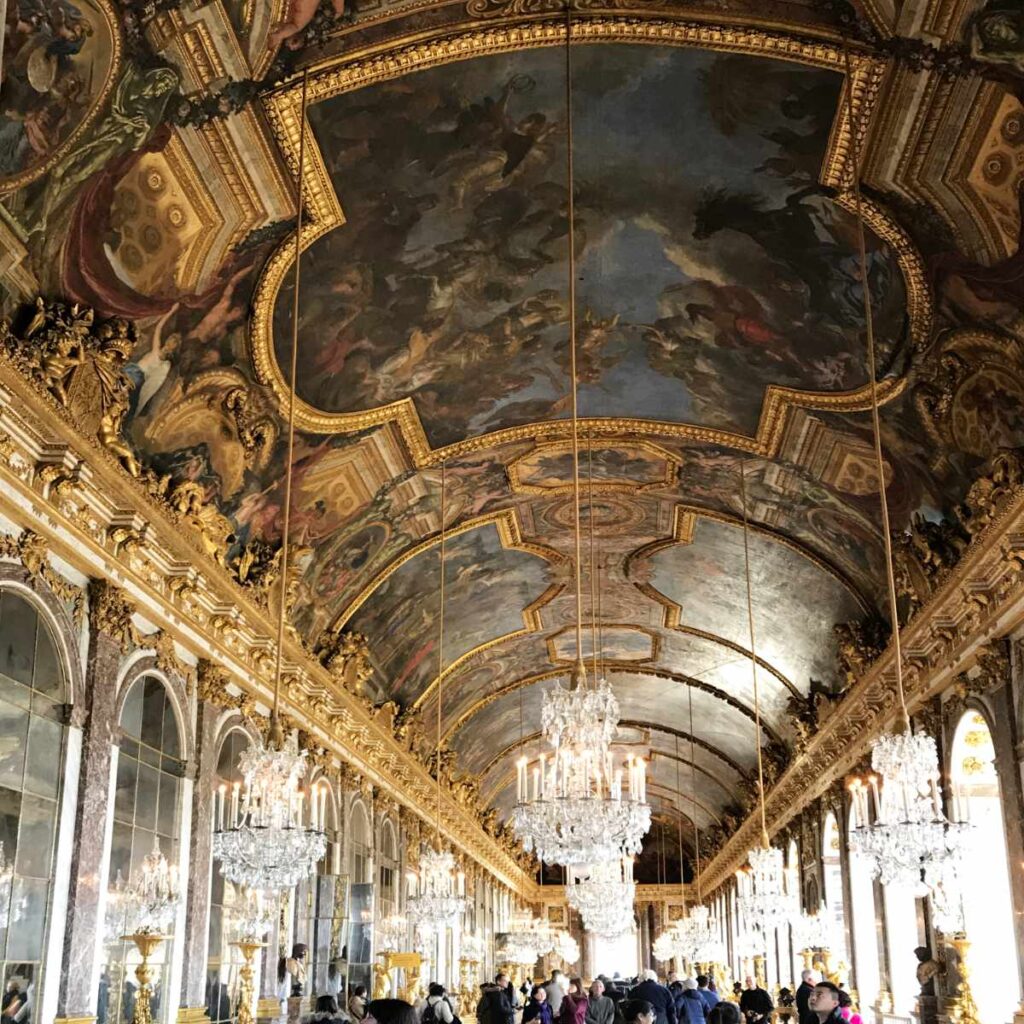
As such, ballet terms and positions were taught in French:
- sauté – to jump
- tendu – to stretch
- assemblé – to assemble
- chaseé – to slide
- coupé – to cut
- croisé – crossed to the audience (front)
- de coté – to the side
- demi-detourné – half turn (towards the back foot)
- pirouette – turn
9. French is one of the official languages of the Olympics.
The father of the modern Olympic movement was a French man named Baron Pierre de Coubertin, who proposed the idea in 1894.
In 1894, in the halls of the University of Sorbonne in Paris, the modern Olympic Games was voted upon, designating Athens and Paris as the first two hosts in 1896 and 1900. As such, the two official languages of the Olympics became English and French.
10. King Françis I insisted that French become the official language of France.
In 1539 French King François I banned the use of most of these regional languages and insisted on a new language he called “françoys” be used for all official purposes.
François I was mostly successful in wiping out the other languages, but some pockets of resistance remain.
11. A lot of culinary terms are in French.
France has some of the top chefs in the world so it is no surprise that many culinary terms are in French. From demi-glaze to flambé and gratin to souflée, you can read about more French cooking terms here.
12. French is an official language in over 29 different countries.
Due to colonialism, French is an official language in 29 countries across multiple continents. These include Canada, Switzerland, Belgium, large parts of Africa, Haiti, and more.
Similar to the British commonwealth, many of these French-speaking countries are members of the “Organisation Internationale de la Francophonie”.
13. The popularity of French is on the rise
In the European Union, French is the 2nd most-widely taught language after English. In the United States, French is the second-most commonly taught foreign language in schools and universities, after Spanish.
In countries across the world, the allure of French has made it a popular language to learn. From quotes in French, poetry, songs, and even tattoos, there is no shortage in the proliferation of French into Anglophone culture.
14. L’Académie Française decides what words belong in the French language.
Unlike English, there are government institutions and associations that regulate officially spoken French. You cannot just invent words and hope it gets adopted into the official lexicon.
The official rules of the French language are decided by an institution called the Académie Française. Created in 1635, it is responsible for defining French language dictionary, grammar and punctuation.
15. The first cinema in the world was in French.
If you visit La Ciotat in the south of France, you will quickly realize that it is the site of the world’s first cinema by the famous French inventors, the Frères Lumières.
It was actually a French inventor named Léon Guillaume Bouly who invented a machine in 1892 for creating motion pictures which was called ‘the cinematographe’. Bouly could not pay the fees for his patents, so he sold his rights to the device and its name to the Lumière Brothers, who applied it to their own device in 1895.
The Lumière brothers created the first movies in French to show at their cinema.
16. It has a lot of silent letters.
There are three categories of silent letters in the French language:
- E muet / Elision
- H muet and aspiré
- Final consonants
Usually, the last letter is not pronounced, making it very tricky for language learners.
17. It is officially celebrated every March.
The UN celebrates “French Language day” officially every March 20th. It was chosen in 2010 to celebrate the 40th anniversary of the “Organisation Internationale de la Francophonie”.
18. In French, objects and nouns are classified as male or female.
Unlike English, nouns and objects in French are assigned as a “masculine” or “feminin”. And this goes for newer words, as well. For example:
- a chair – une chaise (f)
- a fridge – un réfrigérateur (m)
- a week – une semaine (f)
- a day – un jour (m); but “une journée” (f)
This often makes no sense to English-speakers, but even very small French children will instinctively know whether to use the masculine or feminine article.
19. It doesn’t have any words starting with “W”.
French words generally do not begin with a “w”. Words like “weekend”, “Wifi”, and “WC” have all entered the French lexicon from English.
20. Greetings are important in French.
In French, greeting “hello” is so important, there are several different ways to say it depending on the occasion, location, person, etc.
Similarly “goodbyes” range from “au revoir” to “adieu”, with different meanings behind them.
21. French accents are different across France.
Just like in English, different French speakers have different accents. Not only do people from different French-speaking countries sound different, but to a trained ear, local Parisians sound quite different than the local Marseillais.
The southern accent is more of a sing-song accent, while the northern accent is more clipped.
22. Tutoyer vs Vouvoyer: Showing respect in French.
Unlike English, the French language distinguishes between elders and persons of high authority who one must convey a formality.
Vouvoyer, meaning addressing people with a “vous”, is a sign of respect or courtesy. (In English, this used to be “thou”.)
On the other hand Tutoyer where “tu” is used, is a sign of familiarity and in-formalness.
23. Some famous fairytales were originally in French.
Many famous fairytales were adapted into English from French and other languages.
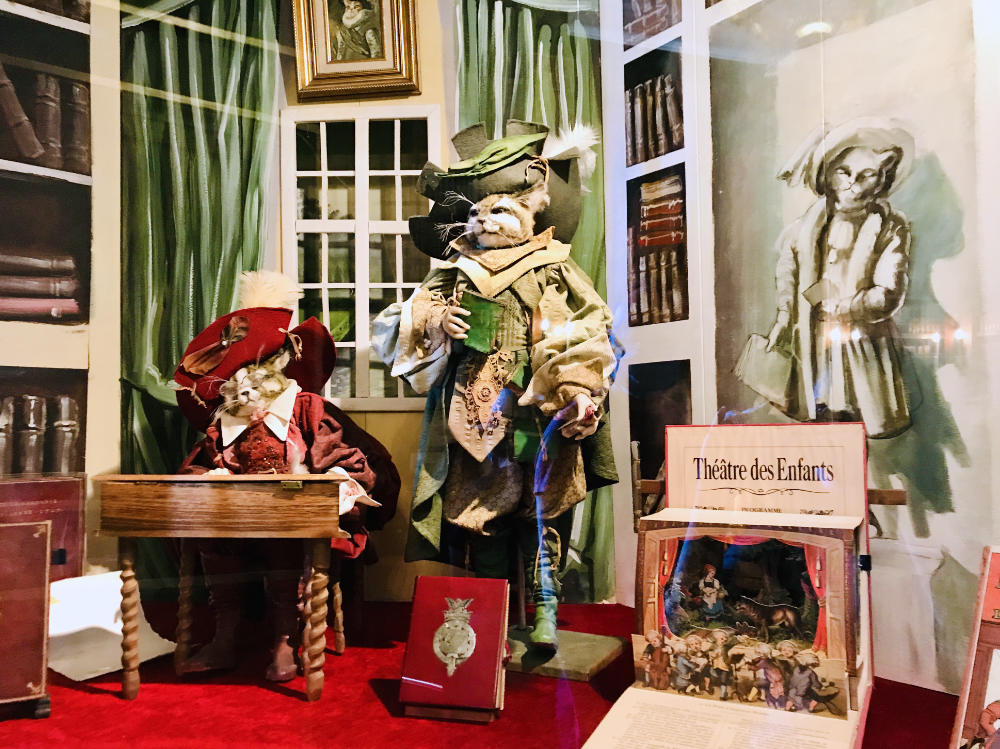
French author Charles Perrault is best known for his fairytales like Puss-in-boots, Little Red Riding Hood and Sleeping Beauty.
Similarly Jean de la Fontaine is famous for his fables of Aesop, and other tales like the “Ant and the Grasshopper” and the “Tortoise and the hare”.
24. The government pays schools to promote French language education around the world.
The French government tries to promote French language education around the world, including funding schools for expatriates who want their children to continue learning French.
The schools known as Lycée Français receive funding from the French government, for locations as far and wide as New York in the USA to Ho Chi Minh city in Vietnam.
25. French slang involves spelling words backwards.
Like all languages, French has its slang and colloquialisms. A particular subset of French slang called Verlan involves reversing the letters of the alphabet.
As an example “Bonjour” becomes “Jourbon” for hello, to greet someone. Another popular one is “meuf” which is the inverse of “femme”, meaning woman.
26. Some English songs are translations of French songs or vice versa.
Some of the top French songs like Claude François’s “Comme D’Habitude” inspired later English versions like Frank Sinatra’s “My Way”.
Another example is the French kids song “Frère Jacques” which became “Brother John”. On the other hand, lullabies like “Incy-Wincy-Spider” were translated from English to the French.
27. French Christmas songs are translations of English songs.
One area where songs are typically translated from English to French is Christmas songs. Most of the popular Christmas songs heard in France these days are French translations, because historically French songs at Christmas were rather slow and moanful.
These days, more upbeat classics like “Jingle Bells” has become “Vive le Vent” and “Santa Claus is coming tonight” has become “Père Noël arrive ce soir“.
28. There are many internationally renowned French authors, whose works are translated to English.
With famous writers like Victor Hugo (Les Miserables and Hunchback of Notre Dame) and Antoine de Saint-Exupéry (Le Petit Prince), France has a rich literary heritage.
The Little Prince is one of the highest-selling children’s books of all time in France, and all three books have been turned into award-winning movies.
29. French comics are very popular.
Some of the biggest names in comic books like Asterix and Obelix were originally in French. France and Belgium have large comic book industries, and many of their most popular titles have been translated to English. You can read more about French comic books here.
30. The Prix Goncourt is a much coveted prize for French authors.
Annually there are several Literature Prizes that are awarded in France to top French authors. The biggest of these prizes is the Prix Goncourt handed out each November to the author of “the best and most imaginative prose work of the year”.
The award is open not just to French citizens, but anyone writing a book in French.
31. French punctuation is written differently than in English.
English and French may both use the Latin alphabet, but the French writing style is quite different as are several punctuation marks. Unlike English, the French accent includes:
- acute accents (é)
- grave accents (è)
- circumflex accents (û)
- cedillas (ç),
- trema (ü)
From guillemets, to commas and periods being inverted, you can read about the differences in French punctuation here.
32. The French word “faux pas” has entered the English lexicon.
Like in other languages, French has a long list of conversational taboos. From talking about money, religion, and even politics, you have to watch your “Ps” and “Qs”.
French taboos are so well known, even the French word “faux pas” meaning “false step” has become common place in English.
33. Some French words are just sounds.
There are a number of words in everyday French, which actually just involve making odd sounds. From “bah” to “pff” and “ben” to “bof”, these are words that you won’t find in any dictionary. You can read more about weird words in French here.
34. There is a debate in French whether the article goes with the person or the title.
One of the more interesting recent debates in whether the “article” goes with the person or the title. To explain, the people with the highest rank are acknowledged first by their official title: Mr. President, Mrs. Mayor, and then Ladies and Gentlemen.
However, as more women take office, there has been a debate amongst French language purists as to whether it should be “Madame Le Maire” or “Madame La Maire“.
Is the “Le” or “La” based on the position or the gender of the person? There is no consensus yet, this is one to watch.
35. There are 23 officially recognized regional languages in France.
There are 23 officially recognised regional languages that existed in France. These included various language from the Romance family of languages, Germanic dialects, Celtic and non-Indo-European languages (like Basque which is not related to any other language).
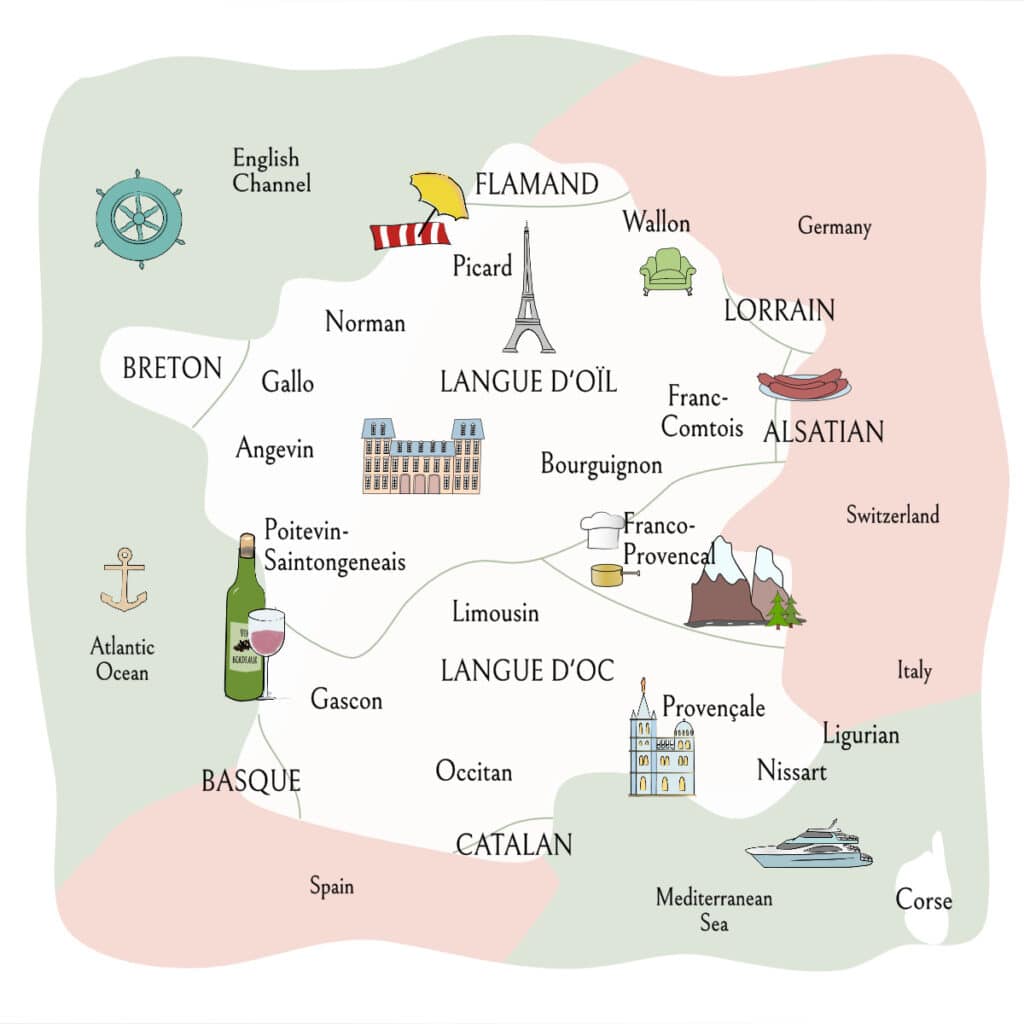
| Regional Languages in France | Spoken in |
|---|---|
| Alsatien | German dialects spoken in the area of Alsace, due to historical wars between France and Germany. |
| Angevin | historical language of the Duchy of Anjou and the House of Plantagenet, but now mostly extinct. |
| Arpitan/Francoprovençal | Spoken round central-eastern France, all around Mont-Blanc and near Switzerland and Italy, including around the Alps. Includes dialects like Lyonnais and Savoyard. |
| Basque | historically a non-Indo-European dialect spoken near Spain (known as Basque Country). Basque is a “language isolate”, meaning it is unrelated to any other existing languages. |
| Bourguignon-Morvandiau | was historically spoken around the Duchy of Burgundy |
| Breton | Gaelic language spoken in Brittany (from the Celtic family of languages) |
| Catalan | language spoken in French region near Spain (Known as Catalan) |
| Champenois | language dating back to the Middle ages, spoken in and around region of Champagne. |
| Corse | language spoken in French island of Corsica |
| Créole | a dialect spoken in current and former French overseas territories like Martinique, Guadeloupe, and Haiti. |
| Flamand/Western Flemish | Dialect of Dutch spoken in north of France, including Dunkerque. |
| Francique Lorrain | Germanic dialect Near Luxembourg, including Moselle |
| Franc-Comtois | spoken in the Franche-Comté region of France and in the Canton of Jura, as well as parts of Switzerland |
| Gallo | was spoken in the area between Duchies of Brittany and Normandy. |
| Gascon | from the region of Gascony in Nouvelle Aquitaine. |
| Ligurian | from the Ligurian region of Italy, was spoken in Ajaccio (Corsica) and Monaco. Related to Niçois. |
| Limousin | from the Limoges and historical Limousin region. |
| Normand | derives from the langues d’Oil, a romance language that was spoken in Normandy and is from the same family as French, Picard and Walloon. |
| Occitan | family of languages spoken in south of France around the region of Occitanie, including cities like Toulouse. |
| Picard | a romance language in the area around the Picardie and Nord-Pas-de-Calais areas, including cities like Lille. |
| Poitevin-Saintongeais | regional romance languages of France, spoken in the historical province of Poitou. |
| Provençale | dialect from the Occitan family of languages. Was spoken in Provence, in cities like Marseille. |
| Walloon | a romance language in some villages near Givet in northern France, near Wallonia, Belgium. |
Today, only a handful of these old regional languages have resisted the onslaught of French. Alsatian, Corse, and Breton are still taught in the French education system in those regions.
But locally, French families from the region will try to speak it at home in order to pass it on to the next generation.

If you enjoyed that article, you may like to read more about French culture. A bientôt!
